- HOME
- How to Apply
- Application Guidance
APPLICATION GUIDANCE
The 26th Duskin Leadership Training in Japan:
A Program for Persons with Disabilities in Asia and the Pacific (2026)
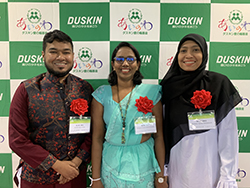
Opening Ceremony
Ⅰ. About the Program
1. Introduction
This program is designed for young persons with disabilities living in Asia and the Pacific who have the willingness and the potential to become leaders in their communities and to work for persons with disabilities. The program offers such young individuals with disabilities an opportunity to learn about welfare policies and services for persons with disabilities in Japan and thereby to obtain knowledge and skills that will support their future activities. It was first initiated in 1999 by the Duskin AINOWA Foundation as a project commemorating the Asian and Pacific Decade of Disabled Persons (1993-2002). Over the past twenty-six years, 147 people from all over Asia and the Pacific completed the program.
2. Sponsor
The Duskin AINOWA Foundation
3. Co-sponsors
Duskin Co., Ltd.
The Duskin Group of Companies
4. Operating organization
Japanese Society for Rehabilitation of Persons with Disabilities (JSRPD)
5. Supporting organization
Ministry of Health, Labour and Welfare, Japan (TBC)
6. The number of trainees selected
A maximum of 10 places are available. In principle, only one trainee can be selected from each country/region.
7. Duration of the program
Approximately 10 months (starting in October 2026 and ending in July 2027)
※The schedule is subject to change.
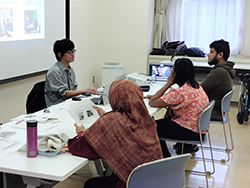
Group Training
8. Target countries/regions
Countries/regions in Asia and the Pacific excluding New Zealand and Australia
9. Training venues
Training takes place at a variety of locations across Japan, including service providers for persons with disabilities, educational institutions and organizations of/for persons with disabilities.
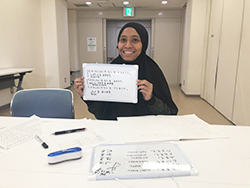
Individual Training
10. Main features of the program
- (1) Approximately the 10-month long training program will consist of three parts ‒ Japanese (sign) language learning, group training and individual training.
- (2) The trainee will design his/her own individual training program based on his/her interests and future goals. A final training plan can be drawn up in consultation with training coordinators at JSRPD and with experts from related organizations.
- (3) In principle, all the training will be provided in the Japanese (sign) language.
- (4) The first three months will be devoted to intensive Japanese (sign) language lessons. Sufficient language skills will enable the trainee to exchange opinions and ideas with people in Japan. It is also a requirement for the trainees to make their presentation in Japanese (sign) language.
- (5) The trainee will learn about the current situation of accessibility and welfare services, and movements of/for persons with disabilities, through observation and hands-on experience.
- (6) There will be opportunities to attend conferences and seminars on disability.
- (7) The trainee will spend the New Year holidays with Japanese family.
- (8) The trainee will meet with disabled leaders and activists from different countries to get the latest information on international cooperation in relevant fields.
- (9) The training covers a wide range of practical topics including how to write project proposals and reports and how to give presentations.
- (10) The trainee will be required to submit both weekly reports and a final report.
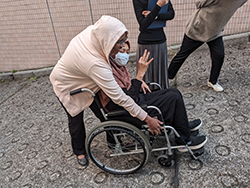
Cross Disability Learning
Ⅱ. Applying
11. Applicant criteria
No education history or prior work experience is required to apply for this program.
However, you must:
- (1) be a person with a disability living in Asia and the Pacific,
- (2) be between 18 and 35 years old as of August 20, 2025,
- (3) be able to communicate in either Japanese (or Japanese Sign Language) or English (or International Sign Language/ASL) 《see 14. below》,
- (4) be determined to become a future leader in your community and to work for persons with disabilities,
- (5) be willing to adapt yourself to the Japanese lifestyle and complete about the 10-month training in Japan,
- (6) understand that no temporary return to your home country will be allowed throughout the entire training period until the completion of the training,
- (7) be able to carry out your everyday activities without assistance,
- (8) have a surety, who is a parent, a sibling of age, or someone who is next of kin, and
- (9) agree to participate in the program at your own risk.
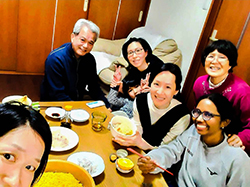
Homestay
12. Notes for applicants
- (1) Fill in the application form in either Japanese or English. Type or handwrite clearly. The application form consists of 8 pages and has 28 sections. Do not exceed the space provided for each section.
- (2) In Section 10, tick an appropriate box. If you tick‘ I work’ or‘ Other,’ clarify the type of your organization/work and the form of your employment by ticking all appropriate boxes or giving details.
- (3) In Section 11, refer to any organization of/for persons with disabilities that you are currently involved with as a member, user and volunteer etc. Do not include any information that you have already mentioned in Section 10.
- (4) In Section 12, write down the name of school/university/any other educational institution from which you graduated and state your major. Do not include any information you have already stated in Sections 10.
- (5) In Section 13, write down the names of your past employers and the duration of each employment, if any. Then briefly describe each organization and your role. Do not include information you have already stated in Section 10.
- (6) In Section 17, describe your current situation regarding your disability in detail, including medical data. Also clarify if you need any assistance in daily life (and if so, of what kind). It is very important for us to correctly understand your disability and current situation.
- (7) In Section 24, give the name and contact details of a person who can act as your referee, such as your teacher, current/past employer, etc. Your referee must be able to discuss your skills and personal qualities. He/she must not be related to you by birth or marriage, be in a personal relationship with you, or live at the same address as you.
- (8) In Section 25, give the name and contact details of a person who can act as your surety. Your surety will be liable to the Sponsor and the Operating Organization for your fulfillment of your obligations as a trainee, including an immediate payment of any financial debt.
- (9) In principle, you are expected to fill in the application form by yourself. However, if you have difficulty in doing so, another person may do it on your behalf. In this case, you must clarify this in Section 26.
- (10) If you are applying by post, attach a photo showing your face and whole body to the first page of the application form. Write your name on the back of the photo. If you are applying by email, send your photo as a separately attached file preferably in the JPEG format. The size of the photo must not exceed 2MB.
- (11) If you are applying by email, please send the application form as an either Microsoft Word or PDF file to the following address: duskin_training@dinf.ne.jp
- (12) Alternatively, you can send your application form by mail or international courier to the following address:
Secretariat for the Duskin Leadership Training in Japan c/o JSRPD
1-22-1 Toyama, Shinjuku-ku, Tokyo 162-0052 JAPAN - (13) You must send your application only once by one of the methods shown above. We regret that we cannot accept applications sent by FAX.
- (14) Your application and attached documents will not be returned.
- (15) The Secretariat will not acknowledge receipt of applications respectively.
13. Submission deadline
August 20, 2025 *Japan Standard Time, JST.
Applications sent by email after this date will not be considered. If you are posting your application form, it needs to be postmarked on or before August 20, 2025.
14. Selection procedures and notification of a result
- (1) The Executive Committee, consisting of 8 members and 1 advisor, will screen all valid applications and shortlist applicants.
- (2) The Secretariat will contact each shortlisted applicant in order to arrange an interview in his/her own country/region. Then a member(s) of the Executive Committee will travel and meet him/her in order to assess his/her suitability as a trainee.
- (3) The Executive Committee will make final decisions at a committee meeting.
- (4) The Secretariat will inform all applicants of a result by email by the end of May 2026.
- (5) No application-related questions can be answered during the selection process.
15. Expenses
- (1) The sponsor will cover the following expenses:
- (i) Cost of traveling between the trainee's home town and Japan, including international flights and domestic transportation.
- (ii) Fees for necessary travel documents, such as passport and visa.
- (iii) Cost of training during the program.
- (iv) Living expenses such as accommodation and food, supplemented by daily allowances.
- (2) The trainee will bear any other expenses which are not listed above.
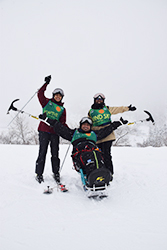
Ski Training
16. How to contact us
If you have any inquiries, please contact the Secretariat by post, or email.
Secretariat for the Duskin Leadership Training in Japan
c/o Japanese Society for Rehabilitation of Persons with Disabilities (JSRPD)
1-22-1 Toyama, Shinjuku-ku, Tokyo 162-0052, Japan
Email: duskin_training@dinf.ne.jp





